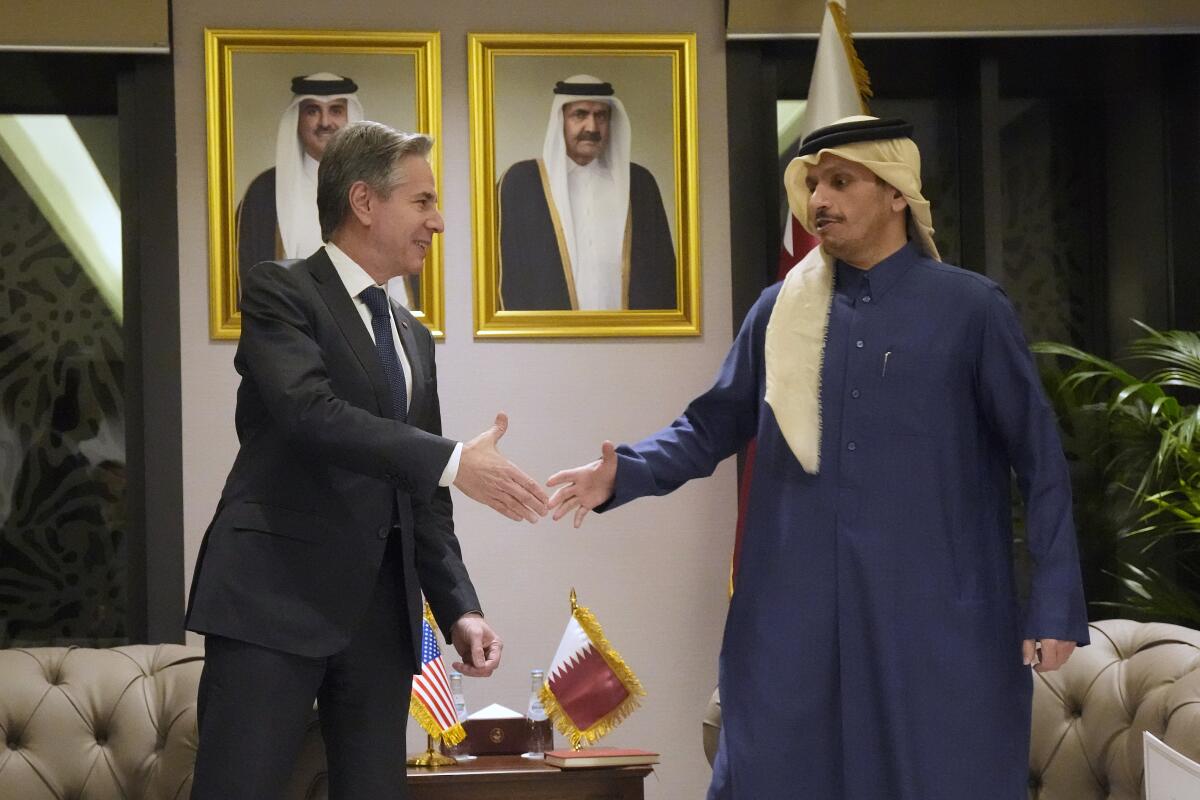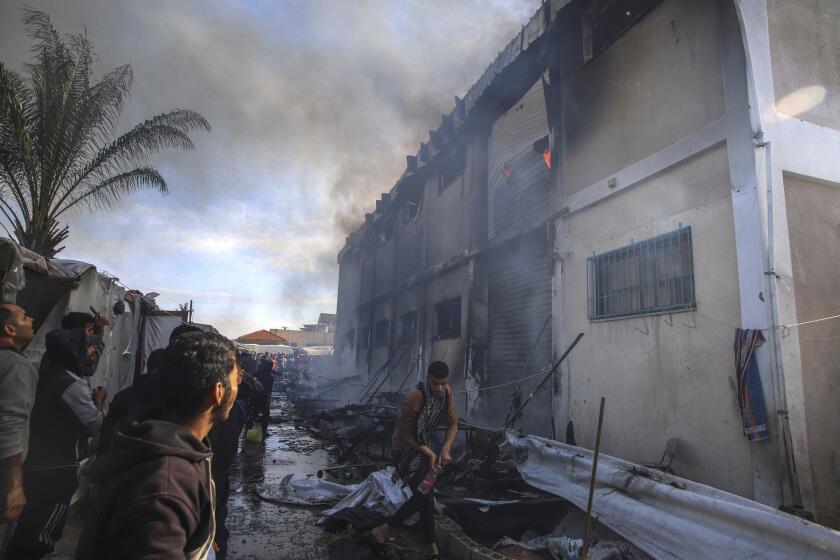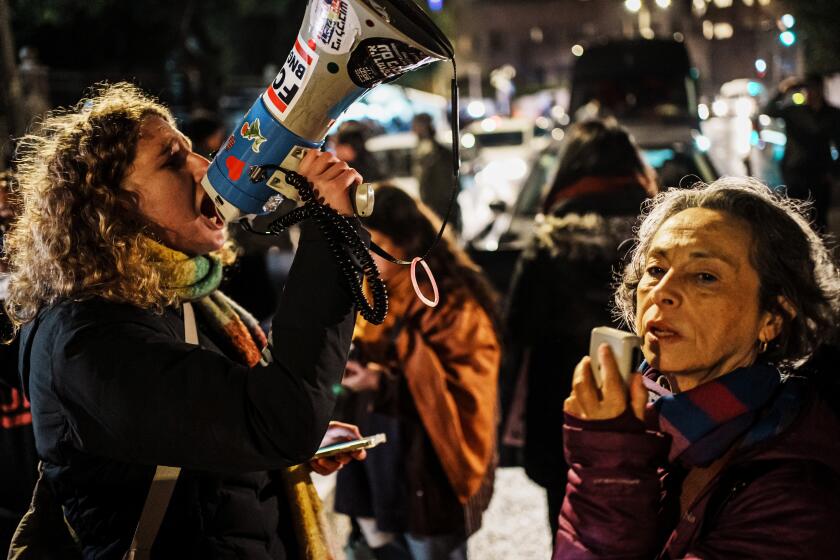Qatar gets ‘positive’ response from Hamas on cease-fire plan as group reiterates demands

- Share via
DOHA, Qatar — Hamas’ response to the latest plan for a cease-fire in Gaza and the release of hostages was “generally positive,” key mediator Qatar said Tuesday, as the militant group reiterated its demand for an end to the war, something Israel has thus far ruled out.
Qatari Prime Minister Sheikh Mohammed bin Abdulrahman al Thani announced the response during a news conference with Secretary of State Antony J. Blinken, who said he would brief Israeli leaders on it Wednesday when he meets with them.
Blinken, who met with Saudi Crown Prince Mohammed bin Salman the day before, said the Saudis still have a “strong interest” in normalizing relations with Israel but require an end to the war and a “clear, credible, time-bound path to the establishment of a Palestinian state.”
Qatar, which has long mediated with Hamas, has been working with the U.S. and Egypt to broker a cease-fire that would involve a halt in fighting for several weeks and the release of the more than 100 hostages still held by Hamas since its Oct. 7 cross-border raid that ignited the war.
Hamas said in a statement that it responded in a “positive spirit” to the latest proposal. But the militant group said it still seeks “a comprehensive and complete” cease-fire to end “the aggression against our people.” Hamas is also expected to demand the release by Israel of a large number of Palestinian prisoners, including high-profile militants, in exchange for the hostages.
Israeli Prime Minister Benjamin Netanyahu has ruled out both demands, saying Israel is committed to continuing its offensive until “total victory” over Hamas and to returning all the hostages. He has also dismissed U.S. calls for the creation of a Palestinian state.
Experts say Israel’s deadly raid on a West Bank hospital may have violated international laws, including a ban on combatants posing as doctors or civilians.
When asked by reporters, President Biden said Hamas’ response “seems to be a little over the top” but that negotiations would go on.
Blinken acknowledged “there’s still a lot of work to be done.” But he said he still believed an agreement on the hostages was possible and that a pathway to more lasting peace and security in the region was “coming ever more sharply into focus.”
“We know the immense benefits that would come for everyone concerned with Israel’s further integration into the region, starting with the benefits for Israel,” Blinken said. “That’s something that Israelis will have to decide for themselves.
“All of this requires difficult, hard decisions, made all the more challenging given the focus on the conflict in Gaza,” Blinken said.
Blinken’s visit also comes amid growing concerns in Egypt about Israel’s stated intentions to expand the combat in Gaza to areas on the Egyptian border that are crammed with displaced Palestinians.
Israel’s defense minister has said his country’s offensive will eventually reach the town of Rafah, on the Egyptian border, where more than half of Gaza’s 2.3 million people have sought refuge and are now living in increasingly miserable conditions.
U.N. humanitarian monitors said Tuesday that Israeli evacuation orders now cover two-thirds of Gaza’s territory, driving thousands more people every day toward the border areas.
The International Court of Justice’s ruling comes at an early stage in South Africa’s case alleging that Israel’s actions in Gaza amount to genocide.
Egypt has warned that an Israeli deployment along the border would threaten the peace treaty the two countries signed more than four decades ago. Egypt fears that an expansion of combat to the Rafah area could push terrified Palestinian civilians across the border, a scenario Egypt has said it is determined to prevent.
As on his previous four trips to the Mideast since the Gaza war began, Blinken’s other main goal is to prevent the conflict from spreading, a task made more difficult by stepped-up attacks by Iran-backed militias in the region and U.S. military responses in Iraq, Syria, Yemen and the Red Sea that have intensified since last week.
Fighting across Gaza
The Palestinian death toll from nearly four months of war has reached 27,585, according to the Health Ministry in the Hamas-run territory, with 107 bodies brought to hospitals over the last day. The ministry does not distinguish between civilians and combatants in its count but says most of the dead have been women and children.
The war has leveled vast swaths of the tiny enclave and pushed a quarter of its residents to starvation.
More than three months into the Israel-Hamas war, the families of hostages held in Gaza have grown disillusioned with Israel’s military operations.
Hamas and other militants killed some 1,200 people, mostly civilians, in the Oct. 7 attack that ignited the war and abducted about 240. More than 100 captives, mostly women and children, were released during a weeklong cease-fire in November in exchange for the release of 240 Palestinians imprisoned by Israel.
The Israeli military said Tuesday it was battling militants in areas across the Gaza Strip, including the southern city of Khan Yunis, where it said troops killed dozens of militants over the last day.
An Israeli airstrike in the city hit an apartment building, killing two parents and four of their five children, according to the children’s grandfather.
Mahmoud al Khatib said his 41-year-old son, Tariq, and his family were sleeping when an Israeli warplane bombed their apartment in the middle of the night. The Israeli military rarely comments on individual strikes but blames Hamas for civilians deaths, saying the militants embed in civilian areas.
Humanitarian crisis persists
U.N. humanitarian monitors said Tuesday that Israel’s evacuation orders in the Gaza Strip now cover two-thirds of the territory, or 95 square miles.
The affected area was home to 1.78 million Palestinians before the war.
The U.N. Office for the Coordination of Humanitarian Affairs, or OCHA, said in its daily report that the newly displaced have only about 1.5 to 2 liters of water per day to drink, cook and wash. It also reported a significant increase in chronic diarrhea among children.
Parents of babies face a particularly difficult challenge because of the high cost or lack of diapers, baby formula and milk.
Zainab al Zein, who is sheltering in the central town of Deir al Balah, said she had to feed her 2½-month-old daughter solid food, such as biscuits and ground rice, well ahead of the typical six-month mark because milk and formula were not available.
“This is known, of course, as unhealthy eating, and we know that it causes her intestinal distress, bloating and colic,” Al Zein said. “As you can see, 24 hours like this, she cries and cries continuously.”
More to Read
Sign up for Essential California
The most important California stories and recommendations in your inbox every morning.
You may occasionally receive promotional content from the Los Angeles Times.
















